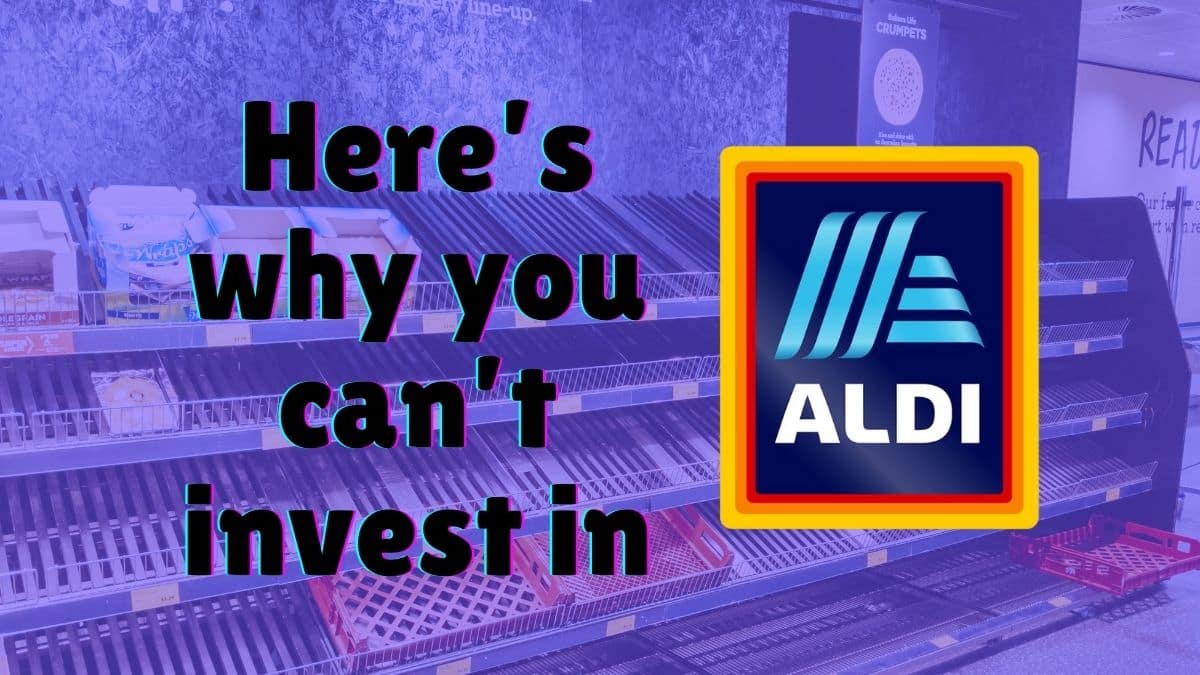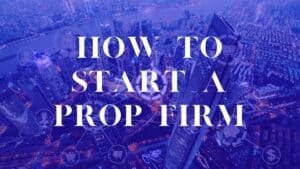You can’t buy Aldi stock. You can buy their frozen schnitzel, but that’s not quite the same thing.
You’ll learn why Aldi isn’t on the stock market, who owns it, and what to look at instead if you want to invest in the grocery world.
Why Doesn’t Aldi Have a Ticker Symbol?
Aldi doesn’t have a stock ticker because it isn’t a public company.
It’s owned by the Albrecht family through private trusts, which means you can’t buy shares in it.
In finance, private ownership means the company doesn’t sell any part of itself to the public. There’s no IPO, no stock exchange listing, and no outside investors. If you’re more interested in alternative investment opportunities, check out our prop trading firm beginner’s guide for a different way to get market exposure.
Aldi stays private for two big reasons:
- It keeps control. No shareholders means no one to answer to.
- It hides details. Private companies don’t need to show profits, losses, or business plans.
That’s exactly how Aldi likes it. They run lean, fast, and quiet. No distractions. No Wall Street nonsense.
If you want to understand how companies control their public image without going public, read our piece on entity SEO and brand positioning.
What Is a Ticker Symbol and Why Does It Matter?
A ticker symbol is a short code used to trade public company stocks.
It helps people buy, sell, and track stocks quickly across platforms.
Think of it like a stock’s nickname. Here are three examples:
- AAPL = Apple Inc.
- TSLA = Tesla
- KR = Kroger
Tickers are given by stock exchanges like NASDAQ or NYSE. They show up in:
- Trading apps
- Investment websites
- News headlines
Without a ticker, a company can’t be traded. That’s why Aldi, as a private business, isn’t listed anywhere.
Who Owns Aldi? (Nord vs Süd Explained)
Aldi is split into two separate companies: Aldi Nord and Aldi Süd.
They were created after the Albrecht brothers, who started Aldi, had a disagreement back in the 1960s. Historians say it was business-related. We’re guessing someone tried to sneak name-brand ketchup into the store.
Aldi Nord runs stores in places like Germany, France, and Spain.
Aldi Süd handles markets like the USA, UK, and Australia.
They operate separately, like two roommates who don’t speak but still split the rent. They have their own supply chains, pricing strategies, and store designs. But both still follow the same playbook: low prices, private labels, no frills.
You’ll never see them compete in the same country. They split territories, stick to their zones, and keep things running tight.
For more on business structures like this, see our why prop trading firms operate offshore guide.
Can You Invest in Aldi in Any Way?
No, you can’t buy Aldi stock, but you can still bet on the trend.
Here’s how smart investors play it without touching Aldi:
- Watch the competition. Buy stock in public grocery giants like Kroger (KR), Walmart (WMT), or Costco (COST).
- Track Aldi’s supply chain. Some of its food suppliers, trucking companies, or warehouse tech vendors may be publicly traded.
- Check private equity funds. Some may invest in retail logistics or real estate connected to Aldi’s growth (though you’ll need serious capital for that).
So no, Aldi shares aren’t on the table, but that doesn’t mean you’re out of options.
Are There Any Public Companies Related to Aldi?
Aldi isn’t public, but some of the companies it works with might be.
Since Aldi doesn’t build everything from scratch, it depends on third-party businesses, some of which are publicly listed.
Look at:
- Real estate developers who manage Aldi’s store locations
- Logistics and supply companies who handle warehousing and transport
- Tech vendors helping with point-of-sale or inventory systems
There could also be licensing or co-branded deals depending on the country. If you find a brand connected to Aldi that is publicly listed, that’s a backdoor way to ride Aldi’s growth.
Aldi’s Growth Without the Stock Market
Aldi is growing fast, without taking a single dollar from public investors.
Unlike Walmart or Kroger, Aldi uses its own profits to fund expansion. No stock market, no shareholders, just pure reinvestment.
In the U.S. alone, Aldi plans to open 800 new stores by the end of 2028. That’s aggressive even for a public company.
Its market share keeps climbing too. Aldi now holds over 4% of the U.S. grocery market, right behind major names like Target and Kroger.
How do they fund it?
Private cash. Aldi uses:
- Retained earnings (money they make and keep)
- Internal cash flow (money from sales)
- No public debt or stock dilution
So while other chains chase investor dollars, Aldi just keeps growing quietly and fast.
If you’re curious about how growth like this works without stock market involvement, see our article on hybrid work productivity and retention challenges—many operational principles apply.
Could Aldi Go Public in the Future?
Don’t bet on an Aldi IPO anytime soon.
Going public means losing control and exposing everything. That’s not Aldi’s style.
If Aldi ever listed stock, they’d face:
- Investor pressure to raise prices or cut staff
- Required financial reports that reveal their strategies to competitors
- Outside influence that could force the company to change
The Albrecht family still owns everything. And they’re not in a rush to invite Wall Street into their boardrooms.
So, unless something dramatic changes, like a buyout, lawsuit, or split, it’s safe to say Aldi will stay private.
What Stocks Should You Watch Instead of Aldi?
Can’t buy Aldi? Watch the next best thing: its biggest rivals.
These three public companies dominate discount groceries:
| Company | Ticker | P/E Ratio (2025) | Dividend Yield | Market Cap (USD) |
| Kroger | KR | 13.2 | 2.4% | $32 Billion |
| Walmart | WMT | 25.7 | 1.5% | $480 Billion |
| Costco | COST | 42.9 | 0.6% | $330 Billion |
- Kroger is the closest in-store competitor.
- Walmart dominates big-box retail and low prices.
- Costco shares Aldi’s no-frills, bulk-buy model.
These are the stocks Aldi-watchers keep in their portfolios.
For deeper market research on competitors like these, read our forex SEO strategy guide.
FAQs About Aldi Ticker Symbol
Is there a stock ticker symbol for Aldi?
No, Aldi does not have a ticker symbol because it is a privately held company. It’s not listed on any stock exchange.
Can you buy Aldi stock on the NYSE or NASDAQ?
No, you can’t buy Aldi stock anywhere. It isn’t publicly traded in the U.S. or globally.
Who owns Aldi and why isn’t it public?
Aldi is owned by the Albrecht family, split into Aldi Nord and Aldi Süd.
They keep it private to stay independent and avoid public scrutiny.
Will Aldi ever go public or launch an IPO?
It’s highly unlikely Aldi will go public. The company avoids investor pressure, keeps financials private, and has no need for external capital.
How can I invest in Aldi’s business model?
You can’t invest directly in Aldi, but you can invest in grocery competitors like Kroger, Walmart, or Costco, or consider ETFs covering the retail sector.
What are the best Aldi competitor stocks to buy?
Top Aldi alternatives for investors include:
- Kroger (KR) for grocery dominance
- Walmart (WMT) for value pricing
- Costco (COST) for private label efficiency
Author
-
Alex started his career creating travel content for Jalan2.com, an Indonesian tourism forum. He later worked as a web search evaluator for Microsoft Bing and Google, where he spent over a decade analyzing search relevance and understanding how algorithms interpret content. After the pandemic disrupted online evaluation work in 2020, he shifted to freelance copywriting and gradually moved into SEO. He currently focuses on content strategy and SEO for finance and trading-related websites.
Recent Posts






